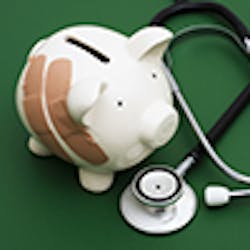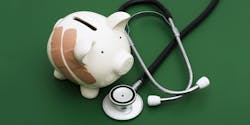Dear New Dentists: Don’t Let Debt Deter Your Dreams
By: Keith W. Gruebele
School loan debt can create major challenges for recent graduates trying to start their professional careers. It can cause stress; lower a credit score; impact the ability to borrow money and secure credit; and force new dentists to re-evaluate their career paths.
In 2016, the average dentist graduated with an astounding amount of student loan debt of $262,119, according to the American Dental Education Association—that’s over one-quarter million dollars. But that’s not all, unfortunately. The recent recession has impacted the personal finances of millennials, as they have lower credit scores than previous generations.
The cost of education is increasingly burdensome to healthcare professionals, and they need to work toward paying off debt and rebuilding their credit. Lenders often base loan approval on credit score, of which 30% is based on outstanding debts. If recent graduates don’t address these issues, they could end up in a position that prevents them from making purchases like a dental practice.
Here are three ways your peers are helping to set themselves up to pay down their debts and achieve their dreams.
1. Refinancing
If your interest rates are out of control and you have to keep track of multiple payments to different lenders each month, refinancing can be a good option. Bankers Healthcare Group offers a student loan solution and consolidation through ELFI from SouthEast Bank. BHG can help with flexible refinancing options that can save you money and simplify your monthly payments.
2. Loan Repayment
Depending on where you work when you finish school, there are a variety of loan repayment programs that may be available to you. By working for a non-profit hospital or in an area considered “high-needs,” you may qualify for Public Student Loan Repayment programs. Dentists who enroll in the military to serve as officers may also qualify for loan repayment. The National Health Service Corps (NHSC) also offers loan repayment options to dentists who work at an NHSC-approved site. For nearly 1/3 of graduates, service to vulnerable and low-income populations is an important reason in pursuing a dental career. If you’re willing to dedicate your time and expertise as healthcare professional to an area in need, you may end up with far fewer loans to repay as a result.
3. Make a Budget
If you’ve reduced your debt through all means available and still have a significant amount to repay, often the best thing you can do is to create a budget plan and stick to it. Figure out exactly how much money you owe and how long your repayment period is to determine how much you owe each month. You may need to make sacrifices during the lean years after school, like living with roommates or carpooling to and from work.
You worked hard to earn your professional credentials – and you may very well have the debt to prove it, but that should not deter you from following your dreams. As you pay down your loans, improve your credit, and advance your career, you’ll be able to change your lifestyle accordingly. With take time, diligence and patience—and maybe even the help and resources of a financial professional or lender—an end can be in sight.
Keith W. Gruebele is Senior Vice President at Bankers Healthcare Group (BHG), where he oversees all loan originations. If you’d like more information about partnering with BHG, the premier provider of hassle-free financial solutions to healthcare professionals, to consolidate your loans with fixed rates and flexible terms, have one of our experts reach out to you directly. Not ready to take the next step? Visit our website to learn more: https://bankershealthcaregroup.com/.

